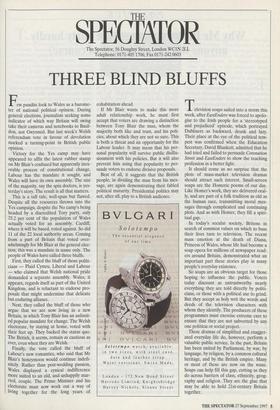SPECTATOR
The Spectator, 56 Doughty Street, London WC1N 2LL Telephone: 0171-405 1706; Fax 0171-242 0603
THREE BLIND BLUFFS
Few pundits look to Wales as a barome- ter of national political opinion. During general elections, journalists seeking some indicator of which way Britain will swing take their cameras and notebooks to Basil- don, not Gwynned. But last week's Welsh referendum vote in favour of devolution marked a turning-point in British public opinion.
Victory for the Yes camp may have appeared to affix the latest rubber stamp on Mr Blair's confused but apparently inex- orable process of constitutional change. Labour has the mandate it sought, and Wales will have its own assembly. The size of the majority, say the spin doctors, is yes- terday's story. The result is all that matters.
This is a tall tale, well-spun but flawed. Despite all the resources thrown into the Yes campaign, despite the No camp's being headed by a discredited Tory party, only 25.2 per cent of the population of Wales actually voted for an assembly. Cardiff, where it will be based, voted against. So did 11 of the 22 local authority areas. Coming from a part of Britain that voted over- whelmingly for Mr Blair at the general elec- tion, this was a mandate in name only. The people of Wales have called three bluffs.
First, they called the bluff of those politi- cians — Plaid Cymru, Liberal and Labour — who claimed that Welsh national pride demanded a separate assembly. Wales, it appears, regards itself as part of the United Kingdom, and is reluctant to endorse pro- posals that might undermine that delicate but enduring alliance.
Next, they called the bluff of those who argue that we are now living in a new Britain, in which Tony Blair has an unlimit- ed popular mandate for change. The Welsh electorate, by staying at home, voted with their feet up. They backed the status quo. The British, it seems, remain as cautious as ever, even when they are Welsh.
Finally, the vote called the bluff of Labour's new romantics, who said that Mr Blair's honeymoon would continue indefi- nitely. Rather than post-wedding passion, Wales displayed a cynical indifference more suited to an old, and unhappily mar- ried, couple. The Prime Minister and his electorate must now work out a way of living together for the long years of cohabitation ahead.
If Mr Blair wants to make this more adult relationship work, he must first accept that voters are drawing a distinction between Tony Blair the man, whom the majority both like and trust, and his poli- cies, about which they are not so sure. This is both a threat and an opportunity for the Labour leader. It may mean that his per- sonal popularity will survive public disillu- sionment with his policies. But it will also prevent him using that popularity to per- suade voters to endorse divisive proposals.
Best of all, it suggests that the British people, in dividing the man from his mes- sage, are again demonstrating their fabled political maturity. Presidential politics may not, after all, play to a British audience. Television soaps sailed into a storm this week, after EastEnders was forced to apolo- gise to the Irish people for a 'stereotyped and prejudiced' episode, which portrayed Dubliners as backward, drunk and lazy. Their place at the eye of the political tem- pest was confirmed when the Education Secretary, David Blunkett, admitted that he had tried and failed to persuade Coronation Street and EastEnders to show the teaching profession in a better light.
It should come as no surprise that the plots of mass-market television dramas should attract such interest. Small-screen soaps are the Homeric poems of our day. Like Homer's work, they are delivered oral- ly, and are part of a folk tradition as old as the human race, transmitting moral mes- sages through complicated and continuing plots. And as with Homer, they fill a spiri- tual gap.
In today's secular society, Britons in search of common values on which to base their lives turn to television. The recent mass emotion at the death of Diana, Princess of Wales, whose life had become a soap opera for millions of newspaper read- ers around Britain, demonstrated what an important part these stories play in many people's everyday existence.
So soaps are an obvious target for those hoping to influence the public. Voters today discount as untrustworthy nearly everything they are told directly by politi- cians, or those with a political axe to grind. But they accept as holy writ the words and deeds of the television characters with whom they identify. The producers of these programmes must exercise extreme care to ensure that they are not subverted by any one political, or social project.
These dramas of simplified and exagger- ated everyday life do, however, perform a valuable public service. In the past, Britain has been united by Parliament, by war, by language, by religion, by a common cultural heritage, and by the British empire. Many or most of these are now on the wane. Soaps can help fill this gap, cutting as they do across barriers of class, ethnicity, geog- raphy and religion. They are the glue that may be able to hold 21st-century Britain together.










































































 Previous page
Previous page